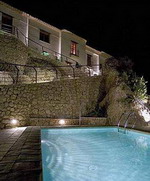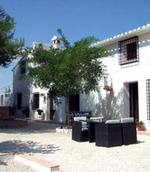



 
Region
of Murcia Travel & Accommodation Guide, Spain
Bed & Breakfasts & Rural Tourism Accommodation in Region of Murcia,
Spain
|
| Primarily an agricultural area with
many traditional towns inland of much historical interest, located in the
southeast of the country between Andalucía and Valencia, on the
Mediterranean coast. The coast, Costa Calida ("the warm coast"),
on the Mediterranean is a major tourist attraction, with beaches of fine
sand and plenty of water sports available. The capital city, Murcia,
has many historic attractions. |
|
View
Region of Murcia map - Photo Gallery of
Murcia Region
|
|
|
|
 |
A
Guide for Tourists who Enjoy Sightseeing in Murcia Spain by
Peter Mason
Sightseeing in Murcia, Spain
is one of the most enriching experiences for any tourist or traveler who
would be fortunate enough to pass by this province. With a rich history
dating back to around 825 A.D. when it was first founded, Murcia has seen
much of religious transition from Islam to Christianity. Anyone who has
a very strong interest in the religious history of Spain may find it here,
as it contains many churches and cathedrals as old as it was first discovered.
One of the most noted construct
is the Cathedral of the Diocese of Cartagena, which was built between 1394
and 1465. Most of the succeeding religious buildings were instead built
throughout the 15th and 18th century. Thus one may see why there are some
designs inspired by Baroque, Renaissance and others.


| Getting there
Reaching the province of
Murcia is easy, as it has two main access points via airplane. The primary
entry point is its own Murcia-San Javier Airport, and the alternative is
airport in the neighboring province of Alicante.
Once in the city, moving
around will be quite convenient with the many transportation methods such
as Buses, Trams, Trains and Taxicabs.
Even if Murcia has already
been urbanized, it still is a major producer of agricultural food. It supplies
neighboring provinces and technically the whole of Spain with fresh produce
such as tomatoes, lettuce, lemons and oranges.
Latest Tourism Trend
 |
With a blossoming tourism rate,
Murcia has directed its economic drive to the propagation of its "residential
tourism". Wherein real estate is made quite affordable and accessible for
travelers and tourists. Europeans and other foreigners who wish to have
a second home in this peaceful urbanized province may do so, as it is an
ideal place of relaxation and meditation.
Festivities to look out
for in Murcia
Anyone who wishes to take
part of the festivities in Murcia may opt to best fly in during the Holy
Week celebration where in such processions are numerous. During this week,
residents take out life-sized holy figurines and parade these around the
city which attracts more people to attend.
Another festivity worth seeing
is the Bando de la Huerta, usually celebrated after Holy Week celebrations.
In this, participants dress up in the traditional huertano clothing and
parade around the city.
Murcia also boasts one of
the best made wines from the rich, fertile soil that the city is located.
Since Spain has been a melting
pot of different races who have influenced the citizenry and the different
established religions, the Three Cultures International Festival is celebrated
in May. Its main objective is to unite the Muslims, Jews, and Christians
in the celebration of national identity.
Be sure to properly set up
hotel reservations and an itinerary of the schedule of events to be done
when visiting Murcia to avoid waiting and delays
Compare car rental prices from Goldcar, Europcar, Centauro Firefly in seconds. Car and van hire at Murcia Corvera Airport is made easy with Auto Spain. Find the best rates on car rentals at the Murcia-Corvera Airport. Compare rates for renting a car in Murcia.
Top
|
| About the Author - The scriptwriter
Peter Mason is really interested in information related to sightseeing
in Murcia, Spain. You can come across his articles on Murcia map at other
sources for Murcia
map information. |

BED & BREAKFASTS
IN MURCIA, SPAIN |
|

ALHAMA
DE MURCIA BED & BREAKFASTS/GUEST HOUSES - MURCIA, SPAIN
|
|

| Alhama de Murcia is a Spanish
municipality in the autonomous community of Murcia. It has a population
of 18,779 (2006) and an area of 311.83 km². The Sierra Espuña
is a mountain range of more than 25,000 hectares in the centre of the region
of Murcia in between the two valleys of the Guadalentin and Pliego rivers.
El
Berro, a village of just 100 inhabitants, situated at 650 metres’ altitude,
is in Sierra Espuña and still functions according to popular local
traditions. There are many useful facilities here. It is an ideal area
for walking and other outdoor sports such as mountain biking, climbing,
paragliding, canoeing, potholing and orienteering, amongst others. |
 |

 |
Rusticae
Bajo el Cejo - Guest House, El Berro, Alhama de Murcia
The hotel is of significant
historic interest. The upper building was originally used by charcoal makers,
who were amongst the first village settlers in El Berro and the lower building
was a water mill, both buildings being set amongst picturesque rock formations
and striking natural features. The hotel is perfectly integrated
in its natural and green surroundings. With the lovely sound of the Fuente
del Chorrico stream still flowing by to this day, the atmosphere is particularly
tranquil and magical. Your accommodation contains everything you
need for an enjoyable stay with modern and comfortable furniture. There
are 4 shared reception rooms with comfortable sofas to lounge on, two of
which have fireplaces for seasonal log fires. There is an outdoor swimming
pool which is also tastefully integrated in the beautiful surroundings,
with various terraces and pretty areas from which to admire the impressive
countryside and enjoy peaceful moments |

CARAVACA
DE LA CRUZ BED & BREAKFASTS/BOUTIQUE HOTELS - MURCIA, SPAIN
|
|

| Caravaca de la Cruz (or simply
and more commonly Caravaca) is a town and municipality of southeastern
Spain in the province of Murcia, near the left bank of the River Argos,
a tributary of the Segura. This city is the capital of the northwest Region
of Murcia. It is the Fifth Holy City of Catholic Christianity, having been
granted the privilege to celebrate the jubilee year in perpetuity in 1998
by the then Pope John Paul II), along with Rome, Jerusalem, Santiago de
Compostela and Camaleño (Monastery of Santo Toribio de Liébana).
It celebrates its jubilee every seven years; the first being in 2003, when
it was visited by the then Cardinal Ratzinger, now Pope Benedict XVI. In
2010 was celebrated the second jubilee, and it surpassed the one million
mark of visits received in 2003.
Caravaca is dominated by the medieval
Castle of Santa Cruz, and contains several convents and a fine parish church,
with a miraculous cross celebrated for its healing power, in honor of which
a yearly festival is held on the 3 May. Caravaca is home to many monuments
ands museums, many of which are important tourist attractions. The hills
which extend to the north are rich in marble and iron. The town is a considerable
industrial centre, with large iron-works, tanneries and manufactories of
paper, chocolate and oil. |


|

 |
Casa
Pedro Barrera, Boutique Hotel, La Almudema, Caravaca
de la Cruz
This
unique 300 year old "cortijo" (farmhouse), set in 20,000m2
of almond groves, was once owned by the famous bullfighter Pedro Barrera
Elbal. Lovingly renovated, the property offers five luxury suites, lounge,
dining room and library. Set in comfortable grounds away from the
hustle and bustle of the city, the hotel has a swimming pool and outdoor
kitchen. A restful place offering seclusion and tranquillity for all.
This lovely boutique hotel is only 15 minutes from Caravaca de la Cruz,
the 5th holiest city in the world. |

| RURAL
SELF-CATERING IN MURCIA, SPAIN |
|

CARTAGENA
RURAL SELF-CATERING / VACATION & HOLIDAY RENTAL ACCOMMODATION
|
|

| Cartagena is a Spanish Mediterranean
city and naval station in the southeast of the Iberian Peninsula in the
Autonomous Community of the Region of Murcia. Cartagena has been the capital
of the Spanish Navy's Maritime Department of the Mediterranean since the
arrival of the Spanish Bourbons in the eighteenth century. As far back
as the sixteenth century it was one of the most important naval ports in
Spain, together with Ferrol in the North. |
 |
| It is a walled town
and has a fine harbour defended by forts. In the time of Philip II of Spain,
it was a major naval seaport of Spain. It is still an important naval seaport,
the main military haven of Spain, and there is a big naval shipyard. Thanks
to its strategic position on the Mediterranean, Cartagena has been inhabited
by many different cultures which have left their mark on its rich cultural
heritage during a glorious and turbulent history. The “Cartagena,
Port of Cultures” initiative was created to allow visitors to enjoy a wide
range of activities and visits, discovering the cultural wealth and rich
history of the city. It’s one of the several projects to energize the tourist
possibilities of this potential major cultural destination, frequently
overshadowed by the mass-tourism due to the proximity of several holiday
resorts, and the refinery and the industrial development which yielded
a bad reputation to the city because of pollution, now fortunately eradicated. |


  Search
for more Rural Self-Catering Accommodation in Murcia
Search
for more Rural Self-Catering Accommodation in Murcia
Top
|


|



